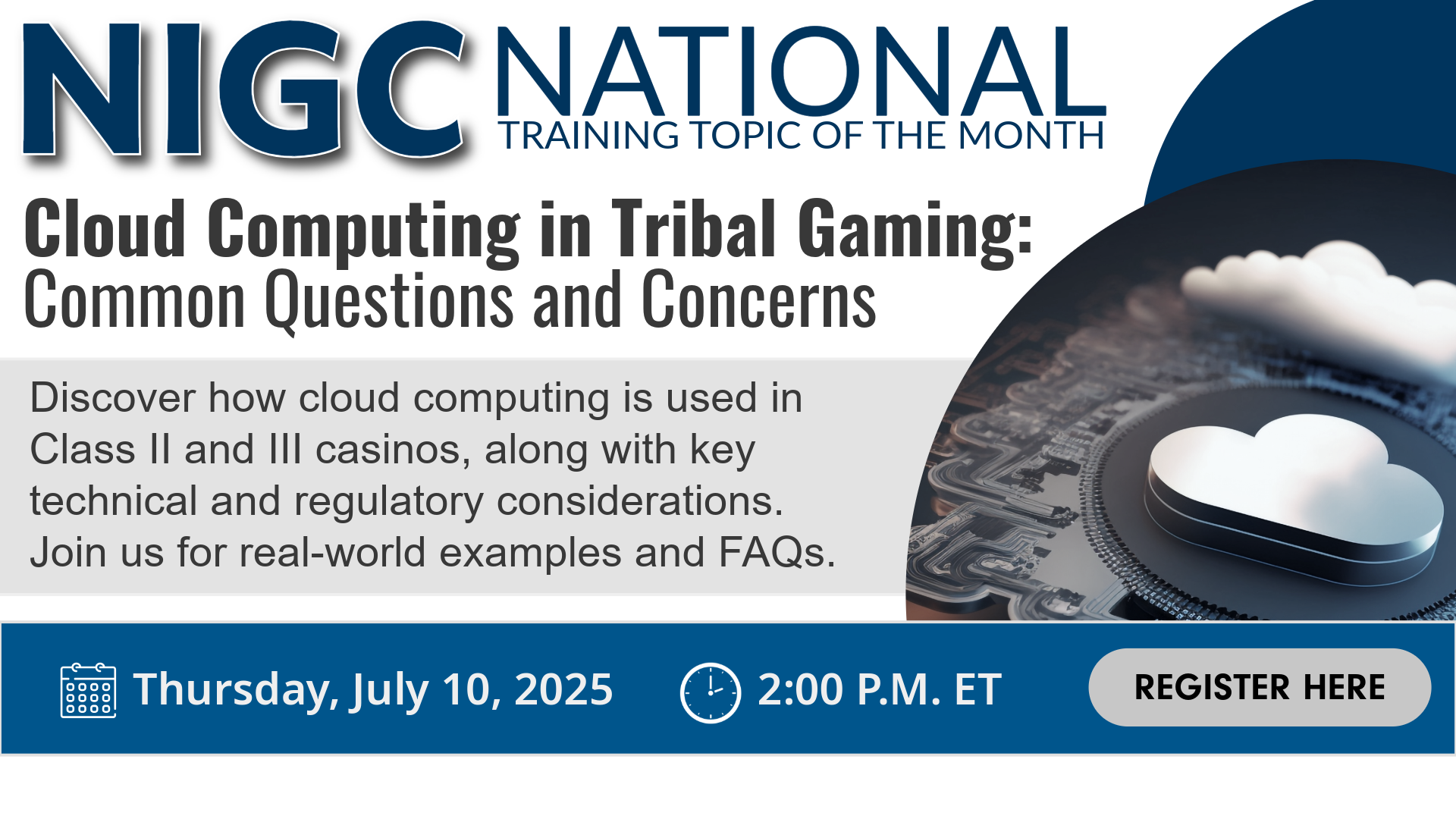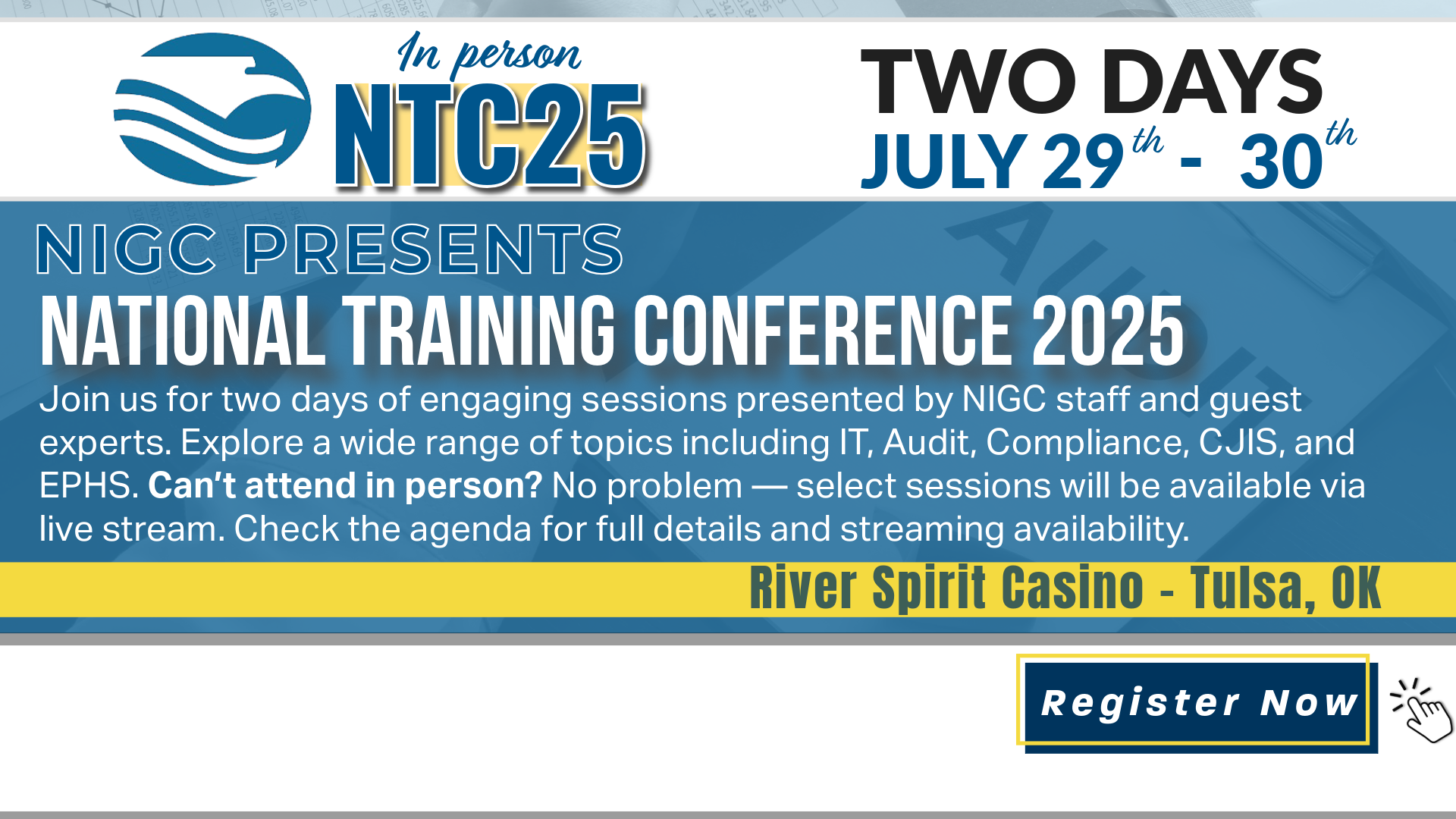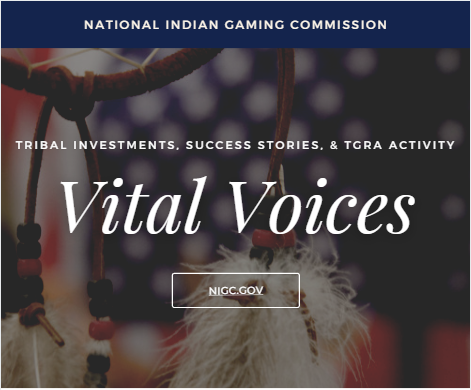
Vital Voices: Tribal Investments, Success Stories, & TGRA Activity
These stories highlight a handful of tribes and tribal gaming stake-holders. They share the investments, commitment to communities, and advancements made to support strong Indian gaming for the long term.
Click here to view the Vital Voices Full Document
Read more community impact stories...
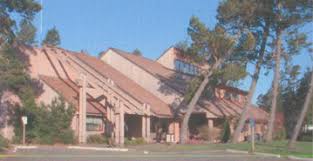
Sources: Earl Davis, Charlene Nelson, Tribal Chair, Mark Phillips, Portland Regional Director, Jamie Judkins, Shoalwater Bay Indian Tribe & Walapa Bay Enterprise Board
Protecting the Well-Being of the People
The Shoalwater Bay Tribe is a federally recognized tribe with 373 members, of whom 84 live on the remote reservation in Pacific County, Washington, 150 miles southwest of Seattle. Formed 150 years ago, the 1/2 square mile reservation is located in a crook of coastline where tribes from the Pacific Northwest used to gather to trade. Flooding and extreme erosion are constant threats. Although small in size, the Tribe has big goals to improve and maintain the physical, social, emotional and spiritual health of its people. The community promotes healthy behavior and active living; invests in the lives and well-being of its youth; and tends to all residents’ medical, dental and mental health needs with its wellness center.
Safety for the Community
With the threat of flooding and tsunami hazards, the Shoalwater Bay tribal members voted to relocate their community. The Tribe purchased land beyond Eagle Hill using gaming funds and constructed a multipurpose building 55 feet above sea level that doubles as an evacuation center in case of a tsunami, earthquake or flood.
Investing in the Health of the Youth
The Tribe’s sharpened focus on community health began in the early 1990s after Tribal women experienced a perplexing increase in the frequency of miscarriages and infant deaths. With the very future of the Tribe in jeopardy, the experience proved to be a turning point. At the time, the closest tribal clinic was 70 miles away at another reservation. Motivated to improve the health of its community, the Tribe developed a small clinic in four rooms at its Tribal center. The clinic’s success led to the opening in 2005 of the larger, stand‐alone Shoalwater Bay Wellness Center, which was funded in part by gaming funds. The Wellness Center now provides medical, dental, behavioral health and substance abuse services not only for the tribal members but for all neighbors. Shoalwater Bay Tribe is a recipient of the “Robert Wood Johnson Foundation” 2016 Culture of Health Prize.
Community Wellness
Tribes are dedicated to improving the quality of the lives of their people and the community. Gaming revenue has made it possible for sovereign nations to develop the infrastructure and means by which to be successful in this mission. Through safety and wellness initiatives tribes are able to restore a sense of balance among their citizens.
The Indian Gaming Regulatory Act created the National Indian Gaming Commission to support tribal self-sufficiency and the integrity of Indian gaming. The NIGC has developed four initiatives to support its mission including (1) To protect against anything that amounts to gamesmanship on the backs of tribes; (2) To stay ahead of the Technology Curve; (3) Rural outreach; and (4) To maintain a strong workforce within NIGC and with its tribal regulatory partners. NIGC oversees the efficient regulation of 506 gaming establishments operated by 246 tribes across 29 states. The Commission’s dedication to compliance with the Indian Gaming Regulatory Act ensures the integrity of the growing $32.4 billion Indian gaming industry. To learn more, visit www.nigc.gov and follow us on Facebook and Twitter.
Read more community impact stories...
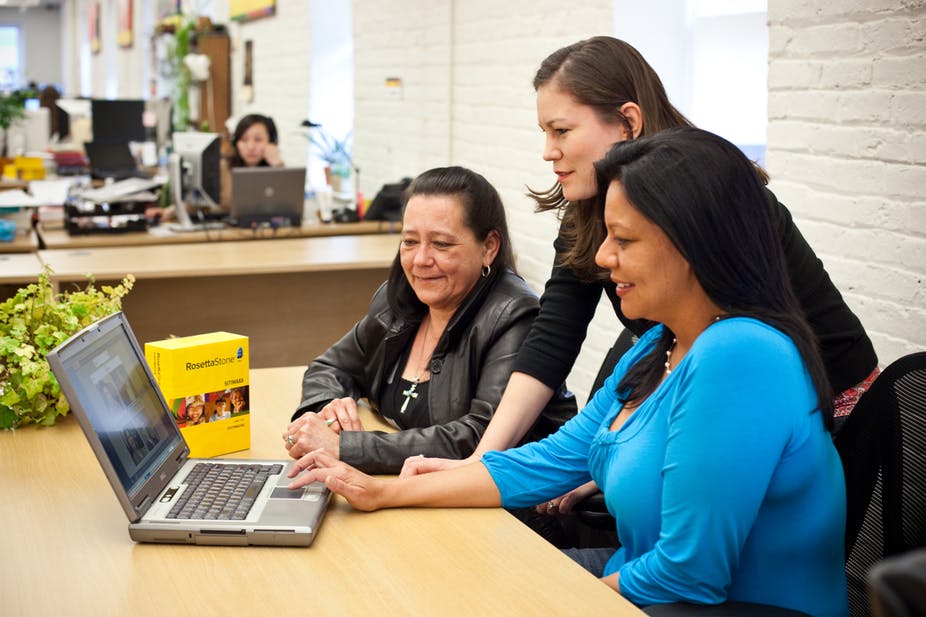
Sources: Kimberly Walden, Cultural Director / Tribal Historic Preservation Officer, Chitimacha Tribe and the NIGC Washington, D.C. Regional Office
The Chitimacha Tribe Awakens Their Sleeping Language
Located south of Baton Rouge and Lafayette on the Gulf of Mexico, the Chitimacha are the only tribe in Louisiana to still occupy a portion of their aboriginal homeland. The Chitimacha have committed revenues from their gaming operations for the restoration of their language.
The people historically spoke the Chitimacha language, a unique language isolate. The last two native speakers died in 1948. The Tribe has worked unrelentingly since the 1990s to revitalize the language based on notes and recordings made by linguist Morris Swadesh about 1930 and memories of Tribal elders. In 2008, the Tribe worked with Rosetta Stone, the makers of language learning software, to develop a program to re-teach the Chitimacha their language. The Tribe has implemented immersion classes for children in their Tribally‐run school and provides adult language classes. Each Tribal household was given a copy of the Rosetta Stone software to support the use of their language at home.
Without the memories of current Tribal elders, dedicated Tribal employees and the linguists the Tribe has worked with, and a successful Tribal gaming operation, the Chitimacha Tribe would not have been able to revive their sleeping language, as well as many cultural practices. These are now being taught at the Tribal school, early learning center and, through a grant from Rosetta Stone to all interested Tribal members around the globe.
Language Preservation
Hundreds of different languages were spoken by American Indian Tribes before the arrival of European settlers. Many of these languages are now extinct. Today, with the help of gaming revenue, tribes are reviving their "sleeping" languages. Through partnerships, development of language programs, and newly-developed software, tribes are able to provide tribal citizens with new ways to maintain and perpetuate their traditional languages and cultures.
The Indian Gaming Regulatory Act created the National Indian Gaming Commission to support tribal self-sufficiency and the integrity of Indian gaming. The NIGC has developed four initiatives to support its mission including (1) To protect against anything that amounts to gamesmanship on the backs of tribes; (2) To stay ahead of the Technology Curve; (3) Rural outreach; and (4) To maintain a strong workforce within NIGC and with its tribal regulatory partners. NIGC oversees the efficient regulation of 506 gaming establishments operated by 246 tribes across 29 states. The Commission’s dedication to compliance with the Indian Gaming Regulatory Act ensures the integrity of the growing $32.4 billion Indian gaming industry. To learn more, visit www.nigc.gov and follow us on Facebook and Twitter.
Read more community impact stories...
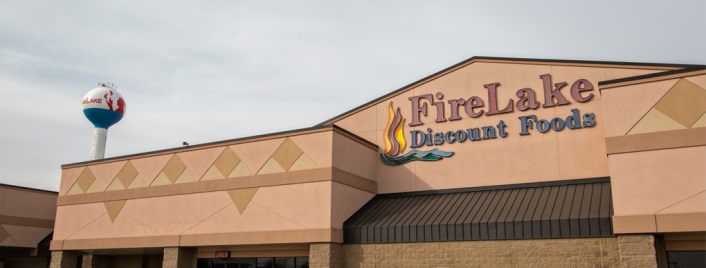
Sources: Chairman John “Rocky” Barrett, Dr. Jim Collard, Director of Economic Development Jennifer Bell, Director of Public Information, Dr. Kelli Mosteller, Citizen Potawatomi Nation Gaming Commissioner Thomas L. Cunningham - Assistant Director of Compliance
Citizen Potawatomi Nation Paves Way For New Jobs in Oklahoma
Located in Oklahoma, the Citizen Potawatomi Nation is the federally recognized government of the Potawatomi people.. Gaming revenue has enabled the Citizen Potawatomi Nation to diversify their economy to become the largest employer in Pottawatomie County with more than 2,300 employees and is the largest creator of new jobs in Shawnee, Oklahoma.
According to the Bureau of Labor Statistics, between 2003 and 2013 the net new jobs in Shawnee increased by 2,045 and during that same time period, the Citizen Potawatomi Nation created 1,422 new jobs — a 70% increase.
In 2017, the Citizen Potawatomi Nation had a $518 million economic impact in the State of Oklahoma including $89 million in wages and benefits, directly supporting more than 2,300 jobs. Tribal purchasing contributed to a $330 million impact on the local economy.
Citizen Potawatomi Nation owns FireLake Discount Foods, the largest tribally-owned grocery store in the United States. It also owns the largest tribally-owned national bank chain, First National Bank and Trust Co. with a number of banks throughout the state. Other Tribal enterprises include a Cultural Heritage Center, FireLake Golf Course, FireLake Ball Fields and the Grand Casino Hotel and Resort, which have become popular destinations for Oklahoma residents and out‐of‐state tourists.
Job Creation
In the past decades, tribes have undertaken major reinvestments of gaming revenues to create more diverse economies. Today, tribes manage a broad assortment of businesses, public services, and governmental enterprises that create significant progress all across Indian Country.
The Indian Gaming Regulatory Act created the National Indian Gaming Commission to support tribal self-sufficiency and the integrity of Indian gaming. The NIGC has developed four initiatives to support its mission including (1) To protect against anything that amounts to gamesmanship on the backs of tribes; (2) To stay ahead of the Technology Curve; (3) Rural outreach; and (4) To maintain a strong workforce within NIGC and with its tribal regulatory partners. NIGC oversees the efficient regulation of 506 gaming establishments operated by 246 tribes across 29 states. The Commission’s dedication to compliance with the Indian Gaming Regulatory Act ensures the integrity of the growing $32.4 billion Indian gaming industry. To learn more, visit www.nigc.gov and follow us on Facebook and Twitter.
Read more community impact stories...
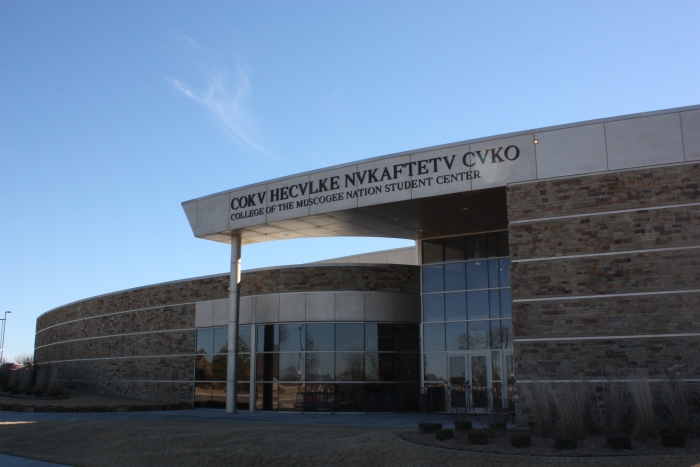
Sources: Lacey M. Azbell, Research Specialist, College of the Muscogee Nation Dr. James King, Former President and Founder of CMN, CMN Current President Robert Bible Tim Harper, Tulsa Region Director
MVSKOKE ETVLWV NAKCOKV MVHAKV SVHLWECVT: Preserving the Past, Cultivating Futures
The Muscogee (Creek) Nation operates several casinos within its Eastern Oklahoma boundaries, including the River Spirit Casino in Tulsa and the One Fire Casino in the Muscogee (Creek) Nation capitol town of Okmulgee, Oklahoma. Tribal gaming revenue has made possible the development of the College of the Muscogee Nation/MVSKOKE ETVLWV NAKCOKV MVHAKV SVHLWECVT.
Through academic excellence and leadership, the College of the Muscogee Nation encourages personal growth, professional development, and life‐long learning. Of special significance to the development of the College is the Creek Treaty of 1866, in which Tribal leaders mandated a requirement for erecting buildings within Creek Country for educational purposes.
A significant number of Muscogee College students are first-generation college students. The College emphasizes native culture, values, language, and self-determination, and provides an inspirational learning environment for students (tribal and non-tribal alike) to be engaged as citizens of their tribal community and with the global society.
Muscogee Nation College is the only accredited and land granted institution of higher education in Oklahoma. Its $19 million (debt‐free) campus provides a $3.2 million economic stimulus to the region.
Education
For many Tribes, out of all the numerous benefits gaming revenue has provided, education stands at the top of the list. Gaming has made it possible for many to provide increased educational opportunities to students on and off of tribal lands including access to early childhood learning, summer youth and after-school programs, and the development of institutions of Higher Education.
The Indian Gaming Regulatory Act created the National Indian Gaming Commission to support tribal self-sufficiency and the integrity of Indian gaming. The NIGC has developed four initiatives to support its mission including (1) To protect against anything that amounts to gamesmanship on the backs of tribes; (2) To stay ahead of the Technology Curve; (3) Rural outreach; and (4) To maintain a strong workforce within NIGC and with its tribal regulatory partners. NIGC oversees the efficient regulation of 506 gaming establishments operated by 246 tribes across 29 states. The Commission’s dedication to compliance with the Indian Gaming Regulatory Act ensures the integrity of the growing $32.4 billion Indian gaming industry. To learn more, visit www.nigc.gov and follow us on Facebook and Twitter.
Read more community impact stories...
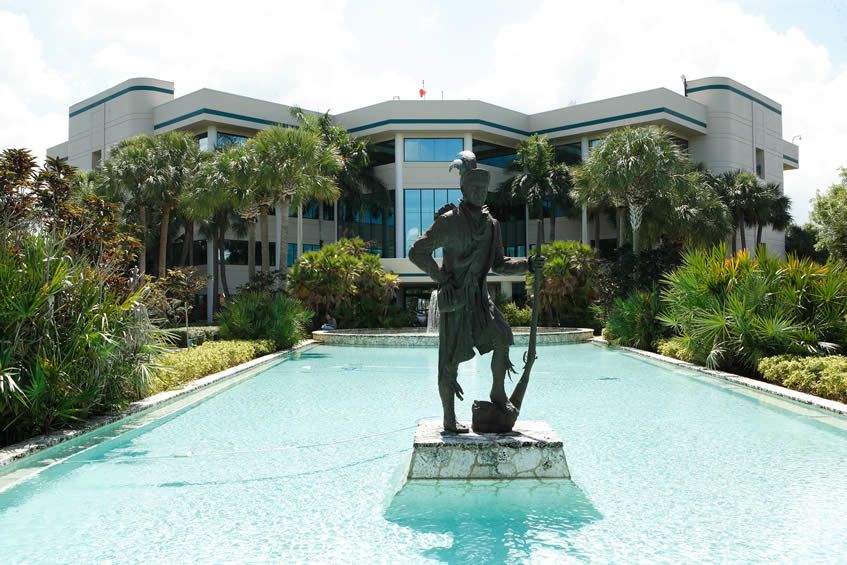
Sources: Rebecca Fell, Seminole Tribe of Florida and the NIGC Washington, D.C. Regional Office
High Stakes in Hollywood: Seminole Tribe of Florida Achieves Self-Sufficiency
Based in the Florida Everglades, the Seminole Tribe was one of the first federally recognized tribal pioneers of Indian Gaming in 1979 opening a high‐stakes bingo hall on the Hollywood Florida Seminole Reservation. Over the past several decades, the Seminole Tribe’s gaming has become one of the most successful and profitable gaming operations in the world. Today, the Seminole Tribe is the owner of a number of successful gaming operations including the Seminole Hard Rock Casino Hollywood and the Seminole Hard Rock Casino Tampa.
As the result of its gaming revenue, the Seminole Tribe can assist Tribal citizens to become self‐sufficient and pursue the education of their choice. Prior to gaming, the Seminole Tribe of Florida struggled to maintain a small number of programs and experienced extreme poverty and joblessness. Today, the Tribe has over 100 programs and is an example of a thriving self-governing community, helping its tribal citizens in every imaginable way. Governmental expenditures are used to support police and fire protection, emergency medical services, education, healthcare, housing, water treatment, economic development, and parks and recreation.
Self‐Determination
Tribal gaming enterprises provide their communities with the financial base necessary to fund social service programs and to support tribal self-determination and to revitalize Native communities. Gaming revenues are also used for infrastructure development such as building new roads, new sewer and water systems, housing and other developments. Gaming proceeds support community self‐empowerment and financial independence for tribes, reducing dependence on federal, state and local resources. In fact, Indian gaming revenue has been able to support local community infrastructure development as well as job creation.
The Indian Gaming Regulatory Act created the National Indian Gaming Commission to support tribal self-sufficiency and the integrity of Indian gaming. The NIGC has developed four initiatives to support its mission including (1) To protect against anything that amounts to gamesmanship on the backs of tribes; (2) To stay ahead of the Technology Curve; (3) Rural outreach; and (4) To maintain a strong workforce within NIGC and with its tribal regulatory partners. NIGC oversees the efficient regulation of 506 gaming establishments operated by 246 tribes across 29 states. The Commission’s dedication to compliance with the Indian Gaming Regulatory Act ensures the integrity of the growing $32.4 billion Indian gaming industry. To learn more, visit www.nigc.gov and follow us on Facebook and Twitter.
Read more community impact stories...

Region: NIGC St. Paul Regional Office Sources: Chief Frank Cloutier, Erik Rodriguez, Interim Public Relations Director Shawnna Ellis, Region Director
A Collaborative Vision: Saginaw Chippewa Gives Back to the Community
A federally recognized tribe located in Michigan, the Saginaw Chippewa Tribe is one of Isabella County’s largest employers. With revenue derived from gaming, the Tribe provides a variety of governmental services to its citizens, the reservation, and surrounding non-Indian communities—giving more than $64 million annually to local and state governments.
The Tribe provides funding for services including police and fire protection, social and health services, housing, and economic development that benefit all of Isabella County. Committing a semi‐annual 2% distribution from funds derived from its properties, the Tribe has contributed over $230 million to schools, local businesses, and other vital community programs since 2015.
These programs include PEAK Community Learning Centers, the Youth and Community Services unit of the Mount Pleasant Police Department, and the BAYANET task force, a community-led initiative. The Tribe recognizes these programs are important because they express the Tribe’s community values and support partnerships with their neighbors.
Community Partnerships
Indian gaming is not about business – it is about strengthening communities. Many tribes and their gaming enterprises take pride in the community partnerships that are created through good neighbor relations. Tribal gaming supports hundreds of charitable organizations throughout the United States. Every year, tribal gaming dollars are directly awarded to local governments and non-profits to positively impact native and non-native communities.
The Indian Gaming Regulatory Act created the National Indian Gaming Commission to support tribal self-sufficiency and the integrity of Indian gaming. The NIGC has developed four initiatives to support its mission including (1) To protect against anything that amounts to gamesmanship on the backs of tribes; (2) To stay ahead of the Technology Curve; (3) Rural outreach; and (4) To maintain a strong workforce within NIGC and with its tribal regulatory partners. NIGC oversees the efficient regulation of 506 gaming establishments operated by 246 tribes across 29 states. The Commission’s dedication to compliance with the Indian Gaming Regulatory Act ensures the integrity of the growing $32.4 billion Indian gaming industry. To learn more, visit www.nigc.gov and follow us on Facebook and Twitter.


